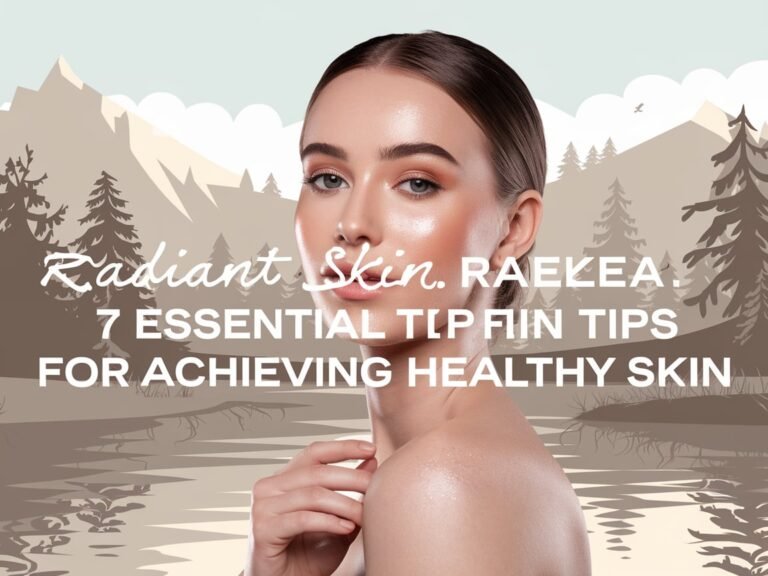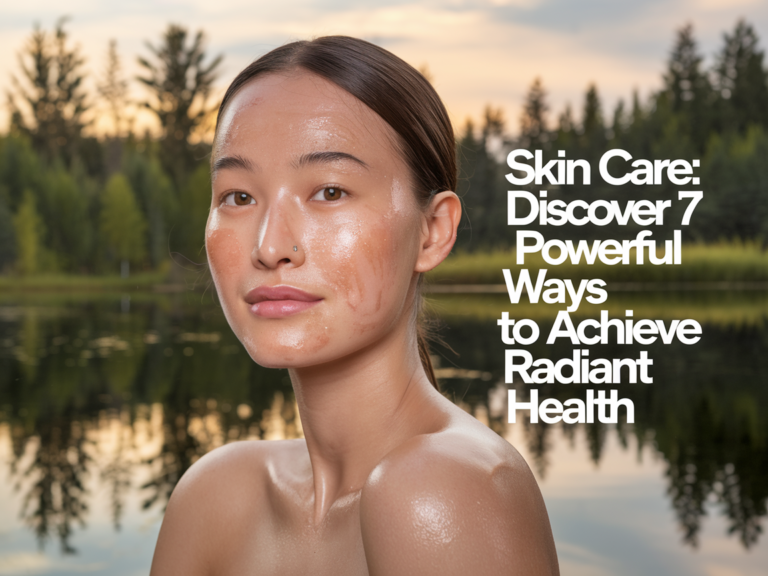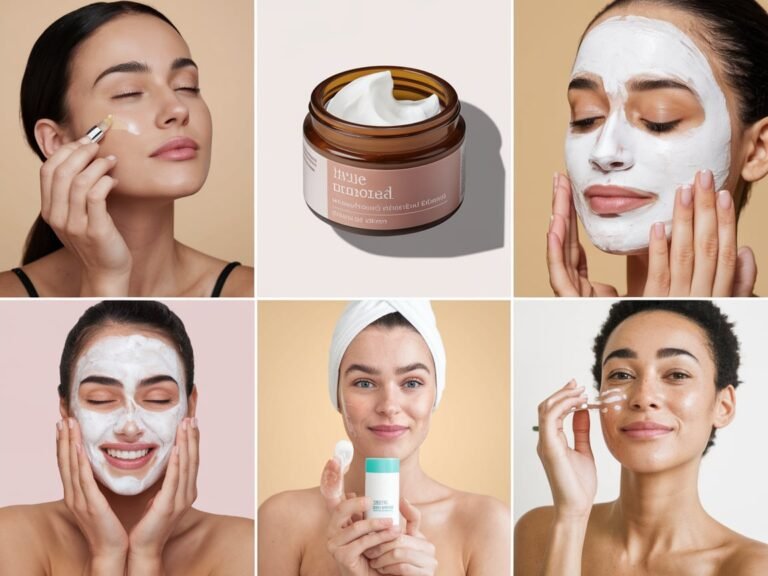
"Discover 7 essential tips for achieving glowing skin naturally through healthy living, including hydration, diet, exercise, and self-care. Your skin reflects your well-being!"
Meta Description:
Discover how a healthy lifestyle can give you radiant skin. Learn 7 tips for achieving glowing skin naturally through diet, hydration, and self-care.
Healthy Skin, Healthy Life: 7 Essential Tips for Achieving Glowing Skin Naturally

Everyone dreams of glowing, flawless skin, but did you know that your overall health plays a crucial role in achieving that radiant complexion? Healthy skin is not just about applying the right skincare products; it’s also about nourishing your body from within.
In this article, we’ll explore 7 practical tips on how to achieve glowing skin naturally by living a healthy life. These tips include proper hydration, eating nutrient-dense foods, exercising, and practicing good skincare.
1. Hydrate Your Skin from the Inside Out

Water is essential for keeping your skin hydrated, nourished, and youthful. When you’re well-hydrated, your skin looks plump, smooth, and glowing. Dehydration, on the other hand, can lead to dry, flaky skin and the appearance of fine lines.
- How it helps: Proper hydration flushes out toxins, improves elasticity, and ensures that your skin stays soft and supple.
- Tip: Aim for at least 8 cups (64 ounces) of water per day. Add fruits like lemon or cucumber for extra hydration and antioxidants.
For more details on hydration and its benefits, check out Harvard Health’s guide on water.
2. Nourish Your Skin with a Healthy Diet
What you eat significantly impacts the health and appearance of your skin. Consuming a balanced diet rich in vitamins, minerals, and healthy fats provides your skin with the nutrients it needs to stay radiant and youthful.
- Key Nutrients for Glowing Skin:
- Vitamin C: Found in citrus fruits, strawberries, and bell peppers. It helps boost collagen production and protect the skin from damage.
- Omega-3 fatty acids: Found in fatty fish like salmon, walnuts, and chia seeds. Omega-3s help to keep the skin hydrated and reduce inflammation.
- Antioxidants: Green leafy vegetables, berries, and nuts help combat free radicals that damage skin cells.
Learn more about skin-boosting foods at The American Academy of Dermatology.
3. Get Moving: Exercise for Skin Health
Exercise not only helps you stay fit but also improves blood circulation, which is essential for healthy skin. Increased blood flow delivers more oxygen and nutrients to your skin cells, giving you that fresh, glowing complexion.
- How it helps: Exercise helps expel toxins through sweat, which can prevent breakouts and promote clearer skin.
- Tip: Aim for 30 minutes of moderate exercise daily, such as walking, running, or yoga.
For more on exercise and skin health, visit WebMD’s fitness and wellness section.
4. Prioritize Skincare with a Simple Routine
A consistent skincare routine is key to achieving and maintaining healthy, glowing skin. Your routine should include cleansing, moisturizing, and sun protection.
- Essential Skincare Steps:
- Cleansing: Gently cleanse your face every morning and night to remove dirt, oil, and makeup.
- Moisturizing: Apply a nourishing moisturizer to keep your skin hydrated and soft.
- Sun Protection: Always wear sunscreen with SPF 30 or higher to protect your skin from harmful UV rays that can cause premature aging.
For professional skin care tips, visit The American Academy of Dermatology.
5. Sleep Your Way to Beautiful Skin
Sleep is crucial for the repair and rejuvenation of your skin. During deep sleep, your skin’s natural healing processes take place, including collagen production and cell regeneration.
- How it helps: Adequate sleep reduces stress hormones like cortisol, which can contribute to acne and skin issues. It also helps repair skin cells and reduce the appearance of dark circles.
- Tip: Aim for 7-9 hours of restful sleep each night to allow your skin to heal and regenerate.
For more information on sleep and skin health, visit The National Sleep Foundation.
6. Manage Stress for Clearer Skin
Chronic stress is known to cause a variety of skin issues, such as acne, eczema, and psoriasis. Stress triggers the release of cortisol, a hormone that can lead to inflammation and breakouts.
- How it helps: Managing stress helps prevent flare-ups and promotes clearer, healthier skin.
- Tip: Practice relaxation techniques such as deep breathing, meditation, or yoga to manage stress.
For more on stress and skin, visit The American Psychological Association.
7. Avoid Smoking and Limit Alcohol
Smoking and excessive alcohol consumption can have a negative impact on your skin’s health. Smoking reduces blood flow to your skin, while alcohol dehydrates it, making it more prone to wrinkles and dullness.
- How it helps: Quitting smoking and reducing alcohol intake will help your skin regain its natural glow and improve elasticity.
- Tip: Limit alcohol consumption to moderate levels and avoid smoking for healthier, younger-looking skin.
For more on how smoking and alcohol affect your skin, visit Mayo Clinic’s guide.
Conclusion: Healthy Living for Radiant Skin
Achieving glowing skin isn’t just about using the best beauty products—it’s about living a healthy lifestyle. By hydrating properly, eating a balanced diet, exercising, managing stress, and practicing good skincare habits, you can enjoy healthy, radiant skin that reflects your overall well-being.
Remember, your skin is a reflection of your inner health, so make self-care a priority, and enjoy the glowing skin that comes with it.
FAQs
Q1: How much water should I drink daily for glowing skin?
A1: It’s recommended to drink at least 8 cups (64 ounces) of water per day to keep your skin hydrated and maintain its natural glow.
Q2: Can my diet affect the health of my skin?
A2: Yes, a balanced diet rich in vitamins, minerals, antioxidants, and healthy fats can significantly improve your skin’s appearance, helping to reduce dryness, acne, and signs of aging.
Q3: What is the best exercise for skin health?
A3: Cardiovascular exercises like running, cycling, or brisk walking improve blood circulation, delivering more oxygen and nutrients to your skin, which helps it look fresh and radiant.
Q4: How can I reduce stress to improve my skin?
A4: Practices like yoga, deep breathing, meditation, and regular physical activity can reduce stress, which in turn prevents stress-related skin issues like acne and breakouts.
Q5: Is sunscreen necessary for healthy skin?
A5: Absolutely! Wearing sunscreen with at least SPF 30 daily protects your skin from harmful UV rays, preventing sun damage, premature aging, and skin cancer.






